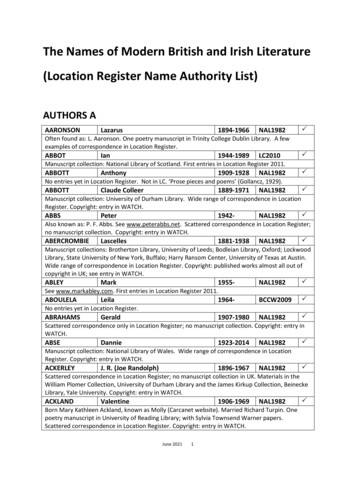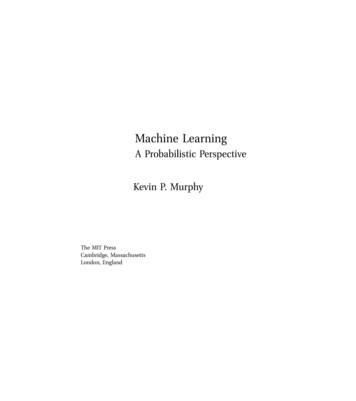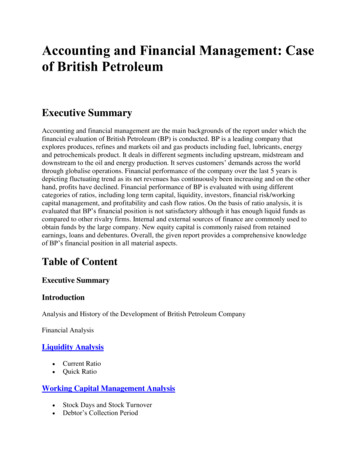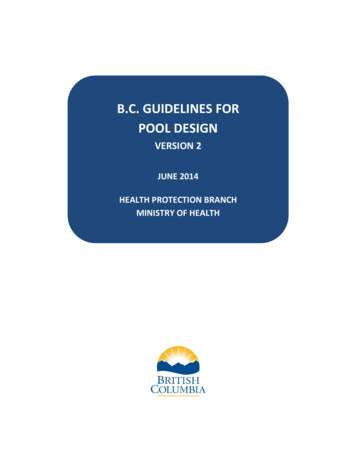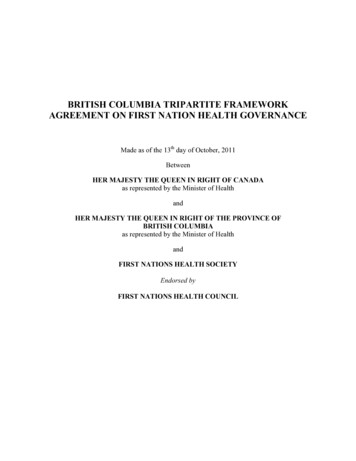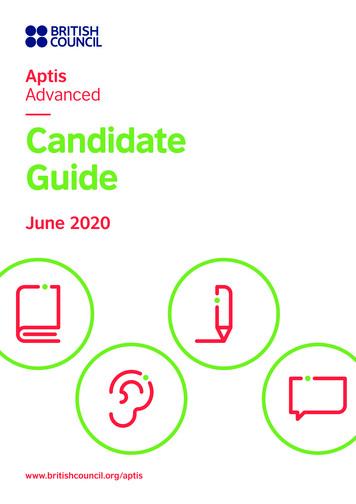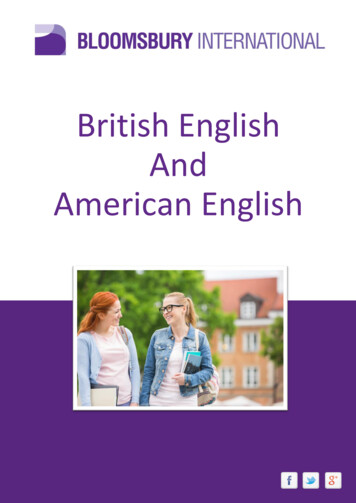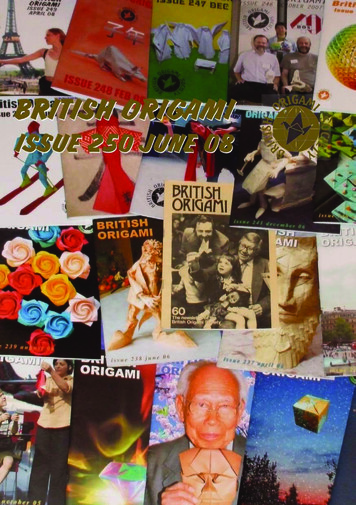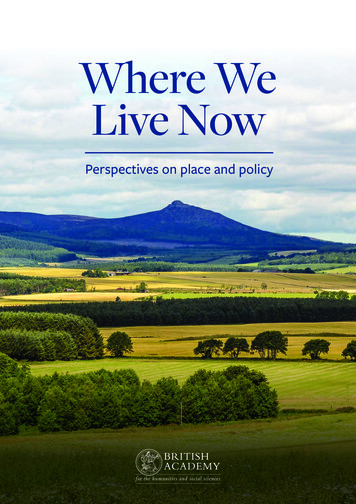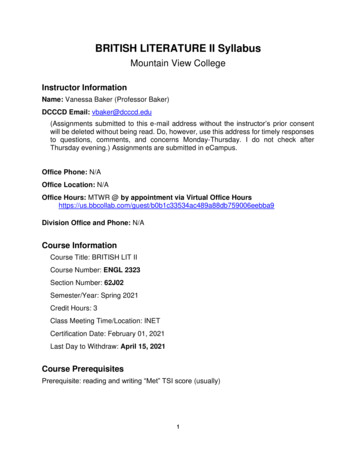
Transcription
BRITISH LITERATURE II SyllabusMountain View CollegeInstructor InformationName: Vanessa Baker (Professor Baker)DCCCD Email: vbaker@dcccd.edu(Assignments submitted to this e-mail address without the instructor’s prior consentwill be deleted without being read. Do, however, use this address for timely responsesto questions, comments, and concerns Monday-Thursday. I do not check afterThursday evening.) Assignments are submitted in eCampus.Office Phone: N/AOffice Location: N/AOffice Hours: MTWR @ by appointment via Virtual Office a88db759006eebba9Division Office and Phone: N/ACourse InformationCourse Title: BRITISH LIT IICourse Number: ENGL 2323Section Number: 62J02Semester/Year: Spring 2021Credit Hours: 3Class Meeting Time/Location: INETCertification Date: February 01, 2021Last Day to Withdraw: April 15, 2021Course PrerequisitesPrerequisite: reading and writing “Met” TSI score (usually)1
Course DescriptionA survey of English literature from the end of the Romantic Movement through theVictorian Era. Special attention is given to the theory of literary interpretation.Student Learning OutcomesAfter successful completion of this course the student should be able to:1. Know and recall the key genres, authors, works, and periods that define Englishliterature from the end of the Romantic Movement (late 18th century) – through theVictorian Movement (the Victorian literary influence began prior to Queen Victoria’sreign: from the Napoleonic Wars of France and allies against the United Kingdom (1803to 1818), to the outbreak of World War I (1914).2. Analyze representative works for theme in relation to authors’ depictions of thesociopolitical, cultural and historical human condition.3. Analyze a literary work from the assigned readings.Texas Core ObjectivesThe College defines essential knowledge and skills that students need to develop duringtheir college experience. These general education competencies parallel the Texas CoreObjectives for Student Learning. In this course, the activities you engage in will give youthe opportunity to practice two or more of the following core competencies:1. Critical Thinking Skills - to include creative thinking, innovation, inquiry, andanalysis, evaluation and synthesis of information2. Communication Skills - to include effective development, interpretation, andexpression of ideas through written, oral, and visual communication3. Teamwork - to include the ability to consider different points of view and to workeffectively with others to support a shared purpose or goal4. Personal Responsibility - to include the ability to connect choices, actions, andconsequences to ethical decision-makingRequired Course Materials - All materials are found online - Linksand/or works will be provided “Rime of the Ancient Mariner (1798) Samuel Taylor Coleridge Frankenstein or the Modern Prometheus (1818) Mary Wollstonecraft Shelley2
Heart of Darkness (1902) Joseph Conrad “In Flanders Fields” (1915) John McCrae A Chromebook, tablet, smartphone, or Linux computer may not be suitable forsome activities in this course. Please ensure you have access to a desktop orlaptop device a Windows or OS X operating system. The online version of MS Word does not allow for proper MLA formatting. Donot use it. Instead, download to your laptop (Windows or iOS) or desktopcomputer the completely free MS suite offered through the district. Thisdownload is incompatible with a Chromebook. PLEASE SUBMIT ALL ASSIGNMENTS IN WORD DOC (preferred), OR GOOGLEDOCS.Graded WorkThe tables below provide a summary of the graded work in this course and an explanationof how your final course grade will be calculated.Summary of Graded WorkAssignmentsTotalsQuizzes and Excercises20%Discussion Board Posts20%Unit Reading Questions25%Research Paper Final Draft (MLA format)35%Total: 100%3
Final GradePointsPercentages Letter Grade900-1,000 90-100%A800-89980-89%B700-79970-79%C600-69960-69%D (This grade does not transfer to most universities.)0-5990-59%F (You will also fail high school English.)Description of Graded WorkImportant: All writing assignments must meet the guidelines stated on the assignmentsheets. Assignments must be submitted on time and meet the mandatory word count. Ifthese stipulations are met and the assignment earns fewer than 90 points, it can berevised as many times as necessary to earn at least 90 points. Writing assignments thatdo not meet the require format: (MLA), the page minimum and/or do not include therequired number of acceptable sources will earn a grade average no higher than “70%”and are not eligible for revision.A Research Proposal, First Draft and Final Draft Guide thatincludes all mandatory requirements for these assignments will beposted in eCampus.Writing Faux Pas: “Don’t Write This!”If you include the following words or phrases in your analysis, you will earn a grade nobetter than 70, and you will be ineligible to revise. Therefore, before you upload youranalysis, you should use CTRL F to find these offenders then edit the sentencesaccordingly. (They are all to be avoided, but I highlighted the most grievous offenders.) First-or-Second-Person PronounsUnless the assigned essay is a narrative or process piece (which will not be coveredin this class), the pronouns: “I,” “me,” “my,” “we,” “us,” “mine,” “our,” “you,” and “your”are completely unacceptable.4
“There is”/ “There are”/ “There will be”. . .Do not write “there.” These constructions move the subject further into the sentenceand leave the reader to wonder who or what moves the action in the sentence. Forexample, instead of writing “There are a lot of stories about America and her history”,write “Authors and historians continue to produce analytical reviews of thesociopolitical and cultural condition of America.” Vacuous words [Words with no qualitative value] Vacuous: empty, blank,void . . .“Good,” “bad,” “nice,” “a lot,” “hard,” “stuff,” “surely,” “really,” “of course,”“thing/something/everything” and “very.” These words do not contribute to an effectiveessay; please do not use them. Authors’ first namesFormal literary writing (essays, analyses) do not refer to authors by their first names.Instead, use their surnames (last names) only, or their first AND last names withouttitles such as Mr. or Mrs. Integrating direct quotes into the essayAssignments are submitted in MLA format. MLA requires all direct quotes to includeattributes known as the in-text parenthetical citations. MLA guidelines will beplaced in eCampus. “that” or “which” when “who” is requiredA person who . . . An issue, concern or matter that or which. Contractions and ApostrophesAvoid the use of contractions in formal essay writing. Instead of: “It’s,” write: “ItOnly use apostrophes when showig possession, i.e., “The boy’s car did not start.”Please be aware that when you write “could of,” this is incorrect grammar. “Could of”is the incorrect representation of “could’ve, which is the contraction for could have.Could of; Would of; Should of are incorrect contractions.Do not use contractions in formal essay writing. Misused rudimentary homophonesToo/ to/ two – they’re/their – where/were/wear – its/it’s; . . .Misuse of these words indicate negligence. If you are unsure about a word and itscorrect use, look it up. We are fortunately in the age of technology. No excuses will beaccepted.5
“Til” or “Till”This is simple because “til” is not a word. NEVER use it. If you mean “until,” writethat. “Till” is a verb that farmers do to soil. You probably do not mean that, so do notwrite that unless your essay is about agriculture. “off of”Nothing is based “off of” anything. It is “based on” something. QuestionsYour essay is based on scholarly research. NO Wikipedia. Use the dcccd librarydatabases. If you find pertenant information outside the dcccd library, getpermission from the instructor before including it in your draft. Do not use questionsin your essay. Your role is to instruct the reader; asking questions of your readerswill make the essay less effective. Avoid all questions unless they are part of a directquote. If they are part of a direct quote, make sure to provide the in-text parentheticalcitation. Exclamation PointsYour essay should have an academic, scholarly tone, so avoid exclamation marks,which reduce your writing to the level of a blog or personal narrative. “One” as the subject of the clauseWe are not British, so do not refer to “one” in that denotation. Use plural nouns andpronouns instead. Slang and/or colloquialismsLook up “colloquial”. Unless writing a direct quote, do not use. Sentences that begin with “Yes,” “No,” “Well” or “So”If not within a direct quote . . . Again . . . Avoid. It is not effective writing in a formalessay. Writing numerals instead of spelling themMLA Style spells out numerals that can be written in one or two words (three, fifteen,seventy-six, one thousand, twelve billion); use numerals for other numbers (2¾; 584;1,001; 25,000,000).6
Citations in the introduction or conclusionAs research is included in the introduction, please include in-text citations forresearched information. As the conclusion paragraph restates the introduction andthere is no new information given, there is no need to include in-text citations inthe conclusion paragraph. To support the credibility of your writing, every “body”paragraph must include at least one in-text citation. Example of an in-textparenthetical citation:"‘I will be good,’ 11-year-old Princess Victoria declared the day she learned that she wasdestined to become the ruler of her nation” (Rompalske).Works CitedRompalske, Dorothy. “A Queen for the Ages.” Biography, vol. 2, no. 3, Mar. 1998, p.72. EBSCOhost, search.Discussion Boards(Editorial: Opinion or critique on a topical issue)For each unit, you must post editorial responses of approximately 150 words ineCampus. You may use first-person pronouns and second-person pronouns in yourresponses, as your posts do not require formal writing. It is appropriate to includegifs, emojis, or links to relevant outside content to enhance your points. Thesedevices help you develop claims and topics for the related literary analyses.Remember that the goal is to apply, analyze, synthesize, and evaluate topics —never to summarize.(Synthesize: Putting together the ideas and findings of multiplesources by examining the similarities and differences between themto make an overall point)Watch this video about the difference between summary and analysis if you areuncertain about how to accomplish this.7
In this informal Discussion Board setting, questions are allowed, unlike in yourformal literary analyses. Remember to be respectful and unjudgmental in yourdiscussion posts. Foul language and degrading comments will not be tolerated.You must also read what your classmates’ posts and respond in approximately 100words to at least three of your classmates’ posts. Respond to what your peershave stated. Do not simply write “I agree with your statement” as a response. Eachwell-developed response to a peer’s post equals 5% of the Discussion Board grade.Late Work PolicyLate work is only accepted with instructor approval based on provable extenuatingcircumstances. Assignments must be uploaded by 11:59PM or before on the day theyare due. This policy is without exception. Any late submissions must be approvedby the instructor. Invalid/Corrupted files that cannot be opened will earn anautomatic zero.While you review the calendar at the end of this syllabus regularly, agood policy is to read all announcements and emails that are posted in,and sent through eCampus. I recommend that you put all the due datesin your phone calendar with reminders.Institutional PoliciesInstitutional Policies relating to this course can be accessed using the link below. Thesepolicies include information about tutoring, Disabilities Services, class drop and repeatoptions, Title IX, and more.Mountain View Institutional Policies8
LITERARY JOURNEYThis study examines the sociopolitical, cultural, and historical climate depicted in literature.It examines literary devices, such as allegories, symbols, and objects that tell those stories.It begins with the a background of the Romantic and Victorian Literary Movements andhow these movements depict the human condition. Research is conducted on each authorand each author’s contemporary era. Works are examined to detect the literary devicesused to ascertain thematic connections to the periods and the authors.An author writes his or her reality. Literary works represent an author’s platform to addresshis or her concerns – generally scathing – about human nature and the greater humanity.RomanticismA movement in the arts and literature that originated in the late 18th century,emphasizing inspiration, subjectivity, and the primacy of the individual.Elements of Romanticism Belief in the individual and common man. Love of (reverence for) nature. Interest in the bizarre, supernatural andgothic. Interest in the past. Looks at the world with more than reasonableoptimism (rose-colored glasses). Faith in inner experience and the power of theimagination. Annotations.“Rime of the Ancient Mariner”The Mariner’s Abatross9
Victorian EraMarked by sweeping progress and ingenuity, thismovement was the backdrop for the world's firstIndustrial Revolution, political reform, socialchange that introduced a railway boom and the firsttelephone and telegraph, and: Family, Society, Isolation.Ambition and Imperfection.Romanticism.Revenge.Prejudice.Lost Innocence.FrankensteinMan’s CreationElements of the Victorian Period Industrialization. Class and status consciousness. Science vs. Religion (This is prominent). Progress. Melancholy. The Woman Question – the fight for equality [SuffrageMovement] Utilitarianism - actions are right if they are useful or beneficialfor a majority; the greatest happiness of the greatest numbershould be the guiding principle of conduct.10
WORKSGreat Britain’s Literary Periods: Romantic and Victorian Eras“Rime of the Ancient Mariner” (1798):(Samuel Taylor Coleridge)Frankenstein or the Modern Prometheus (1818):(Mary Wollstonecraft Shelley)British Colonization: THE CONGOHeart of Darkness (1902):(Joseph Conrad)WORLD WAR I: Overview & Lecture“In Flanders Fields” (1915):(John McCrae)Course schedule begins next page11
Course ScheduleTopicAssignmentsStart HereCarefully read the entire syllabus. Reread relevant parts of itbefore each assignment is due. When there are hyperlinks in theguidelines, please open them. They will take you to instructionalinformation. If a link appears in multiple places, the information willbe the same; it is there for your convenience.Discussion Post #1Discussion #1: Post a response to the assignment in eCampus:Discussion Board. This exercise challenges your analyticalthinking, as well as introduces you to me (Professor Baker) andyour peers.Remember: Respond in approximately 100 words to at leastthree of your classmates’ posts. Respond to what your peershave stated. Do not simply write “I agree with your statement”as a response. Each well-developed response to a peer’s postequals 5% of the Discussion Board grade.Your Post is Due: Thursday 01/21 by 11:59 PM.Repond to three peers by Monday 01/25 by 11:59 PM.Follow all instructions provided in the eCampus discussion thread. Romantic &Victorian ErasRead the Overview & Lecture (eCampus): Literary MovementsColeridge: “Rime” Morality Judgment Sin Consequences LifeRead the epic Poem “Rime of the Ancient Mariner” (SamuelTaylor Coleridge) posted in your eCampus Assignments andemailed through eCampus.Listen: YouTube audio reading: “Rime of the Ancient Mariner”(Reader: Orson Welles)Link:Rime of the Ancient Mariner Orson Welles - YouTubeListening to the reading while you read will help your understanding.12
TopicDiscussion BoardReading QuestionsAssignmentsDiscussion Board: Thesis of “Rime”: Post Thursday 02/04 by11:59PM. Repond to peers by Monday 02/08 at 11:59 PM.Respond to the Reading Questions Posted in eCampus.[02/25/2021]Overview/LectureRead: Overview & Lecture Mary Shelley and Frankenstein(eCampus)ShelleyFrankenstein:Read: Frankenstein or the Modern Prometheus (eCampus)Listen: Frankenstein or The Modern PrometheusDiscussion BoardDiscussion Board: Frankenstein [The need for community] IsolationThursday 03/04 at 11:59PM. Repond to three of your peers by Alienation Dehumanization Monday 03/08 at 11:59 PM. RevengeReading QuestionsReading Questions (eCampus) [03/24/2021]Conrad: Heart ofRead: Overview & Lecture Conrad - Heart (eCampus)Darkness: Imperialism Colonization Exploitation Discrimination CorruptionDiscussion BoardReading QuestionsRead: Heart of Darkness (eCampus)Audio Link:HEART OF DARKNESS by Joseph Conrad - FULL AudioBook .Discussion Board: Heart of Darkness [Moral Corruption]Thursday 03/29 11:59PM. Repond to peers Monday 04/01 at 11:59 PM.Reading Questions (eCampus) [04/16/2021]13
TopicMcCrae: “InFlanders Fields” War Carnage Death Grim RealityDiscussion BoardAssignmentsRead: Overview and Lecture (eCampus): World War IRepresentationRead: John McCrae: “In Flanders Fields” (eCampus)Discussion Board: “In Flanders Fields” [Voice of the fallensoldiers]Thursday 04/20 at 11:59PM. Repond by Monday 04/23 at 11:59 PM.the voice of the fallen soldiers buried under those hardy poppiesAnalyticalResearch PaperFinal AssignmentLiterary Representation of the Human ConditionAnalyze: One of the Semester ReadingsEssay Guide (eCampus)[5/13/2021]14
A survey of English literature from the end of the Romantic Movement through the Victorian Era. Special attention is given to the theory of literary interpretation. . expression of ideas through written, oral, and visual co
